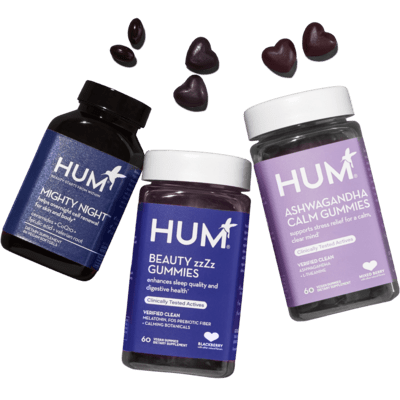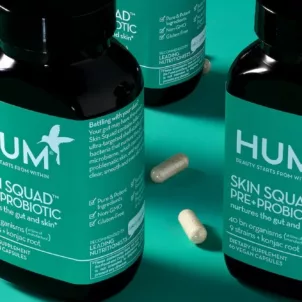THE WELLNEST • Supplements
Best Vitamins & Supplements for Skin & Beauty
By Julie Biegner •
December 15, 2015
Medically Reviewed By
Gaby Vaca-Flores, RDN, CLE
Registered Dietitian Nutritionist
The research surrounding beauty nutrition is more exciting than ever. Here, we’ve ranked the best beauty vitamin supplements for skin and hair health.
 To determine the best beauty nutrients, HUM looked far and wide. We investigated trending herbs, cleansing minerals, plants from the far reaches of the globe, key vitamins, and everything in between. Also, we looked for the nutrients that have inspired the most exciting research in the last decade. Finally, we followed the recommendations of our resident nutritionist Alex Caspero, MA, RD, the support from the scientific community, and consumer access and popularity.
To determine the best beauty nutrients, HUM looked far and wide. We investigated trending herbs, cleansing minerals, plants from the far reaches of the globe, key vitamins, and everything in between. Also, we looked for the nutrients that have inspired the most exciting research in the last decade. Finally, we followed the recommendations of our resident nutritionist Alex Caspero, MA, RD, the support from the scientific community, and consumer access and popularity.



*[1] Sibi G. Inhibition of lipase and inflammatory mediators by Chlorella lipid extracts for antiacne treatment. J Adv Pharm Technol Res. 2015 Jan-Mar; 6(1): 7–12. [2] Morita K, Ogata M, Hasegawa T. Chlorophyll derived from Chlorella inhibits dioxin absorption from the gastrointestinal tract and accelerates dioxin excretion in rats. Environmental health perspectives. 2001;109(3):289-94. [3] Takekoshi H, Suzuki G, Chubachi H, Nakano M. Effect of Chlorella pyrenoidosa on fecal excretion and liver accumulation of polychlorinated dibenzo-p-dioxin in mice. Chemosphere. 2005;59(2):297-304. **[1] Simopoulos AP. Omega-3 fatty acids in inflammation and autoimmune diseases. J Am Coll Nutr 2002;21:495-505. [2] Logan AC. Omega-3 fatty acids and acne. Arch Dermatol 2003;139:941-3. [3] Zouboulis CC, Nestoris S, Adler YD, Orth M, Orfanos CE, Picardo M, et al. A new concept for acne therapy: a pilot study with zileuton, an oral 5-lipoxygenase inhibitor. Arch Dermatol 2003;139:668-70. [4] Bowe WP, Joshi SS, Shalita AR. Diet and acne. J Am Acad Dermatol. 2010 Jul;63(1):124-41.
 To determine the best beauty nutrients, HUM looked far and wide. We investigated trending herbs, cleansing minerals, plants from the far reaches of the globe, key vitamins, and everything in between. Also, we looked for the nutrients that have inspired the most exciting research in the last decade. Finally, we followed the recommendations of our resident nutritionist Alex Caspero, MA, RD, the support from the scientific community, and consumer access and popularity.
To determine the best beauty nutrients, HUM looked far and wide. We investigated trending herbs, cleansing minerals, plants from the far reaches of the globe, key vitamins, and everything in between. Also, we looked for the nutrients that have inspired the most exciting research in the last decade. Finally, we followed the recommendations of our resident nutritionist Alex Caspero, MA, RD, the support from the scientific community, and consumer access and popularity.
Best Beauty Vitamins + Nutrients
For all-over health, well-being, balance, and beauty, look to these top trending nutrients.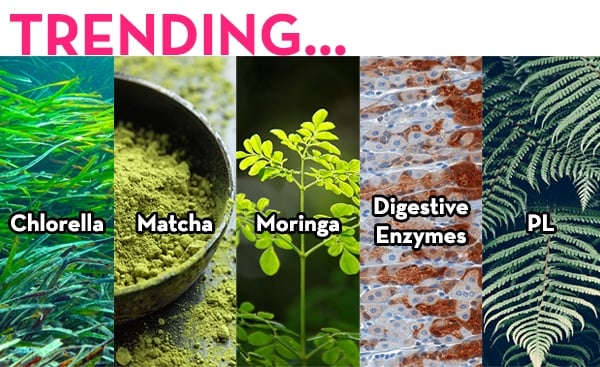
Chlorella Green Algae
This green algae is packed with macronutrients and a plethora of healthful beauty benefits. Alex says, “Chlorella contains vitamin C and is rich in protein, omega-3 fatty acids, calcium, iron, and fiber. In addition to being a powerful antioxidant, chlorella has been shown to benefit the skin. Detoxing properties help increase skin firmness and reduce symptoms of acne, rosacea, and overall redness.” Research says: Experimental research has shown that several chlorella species inhibit lipase enzymes, free radical (ROS) and pro-inflammatory cytokines production (such as TNF-alpha). It also shows potent anti-acne activity in a test-tube setting. Furthermore, previous studies reported detoxification properties of chlorella. In turn, chlorella might have benefits for its complementary use in skin disorders and other toxin-induced ailments. Clinical trials are warranted to confirm chlorella’s efficacy in patients suffering from acne vulgaris. [*]Matcha Green Tea
In matcha green tea (as opposed to traditional green tea), you’re drinking the actual leaves that have been grounded into a powder. Because the leaves are ingested, your body absorbs even more of the nutrients and antioxidants that are rich in green tea. Alex says, “I love matcha! I drink a cup of it almost daily. Like other teas, matcha is very high in antioxidants to combat free radicals that lead to aging, wrinkles, and general inflammation. Matcha is also high in epigallocatechin gallate (EGCG), a catechin thought to have cancer-fighting properties.” Research says: The Journal of Chromatography published a report showing three times more EGCG in matcha than in regular green tea [1]. Additionally, studies in animals showed antioxidant and anti-inflammatory polyphenols in green tea extracts may reduce some harmful effects following exposure to UV light [2], making matcha a trending skin and beauty essential.Moringa
Native to the Himalayas, this plant is an incredibly nutritious source packed with protein, calcium, iron, vitamin C, vitamin A, and carotenoids. Moringa leaves, seeds, and root extracts all have considerable benefits. They provide antioxidants, anti-inflammatory properties, and anti-cancer potential. They also support hypoglycemia. Research says: An article published by Frontiers in Pharmacology concluded that they found “compelling, albeit very preliminary, experimental evidence of a therapeutic potential” of the leaves of moringa in chronic high blood sugar and high cholesterol [1]. Another article in the Journal of Ethnopharmacology surmised that the seeds of this plant have immunosuppressive activity [2]. Further, moringa has potent antioxidant activity that can protect the body against free radicals and prevent oxidative damage [3].Digestive Enzymes
Digestive enzymes help optimize nutrient absorption and break down nutrients from carbs, proteins, fats, and fibers. According to Alex, “For bloating, gas, and uncomfortable digestion, there’s no better combination than a powerful probiotic and a wide-range digestive enzyme. Of course, 80% of the immune system is housed in the gut. So if our GI is inflamed, it’s going to show on our face in the form of redness, a rash, or acne.” Research says: In a double-blind trial, a lipase blend (pancreatic enzymes that aid in the digestion of fats) was shown to significantly reduce gas, bloating, and fullness after a high-fat meal. Additionally, anecdotal support has found that pancreatic digestive enzymes such as lipase can help with acne rosacea. Furthermore, one controlled study found rosacea patients produced less lipase than healthy people [1].Polypodium Leucotomos (PL)
This South-American fern is also known as Fernblock. It boasts antioxidant and anti-inflammatory benefits along with DNA protection, making it an up-and-coming skin essential. By protecting skin cells against UV radiation, this herb fights off free radicals that damage the skin. Research says: The Journal of the American Academy of Dermatology published a study on nine healthy participants exposed to varying doses of artificial UV radiation. It concluded that “oral administration of PL is an effective systemic chemophotoprotective agent leading to significant protection of skin against UV radiation” [1].Best Vitamins + Nutrients for Skin
While different nutrients can be more beneficial for different skin concerns, these top five vitamins and nutrients are all-stars for a clear, glowing, and youthful complexion.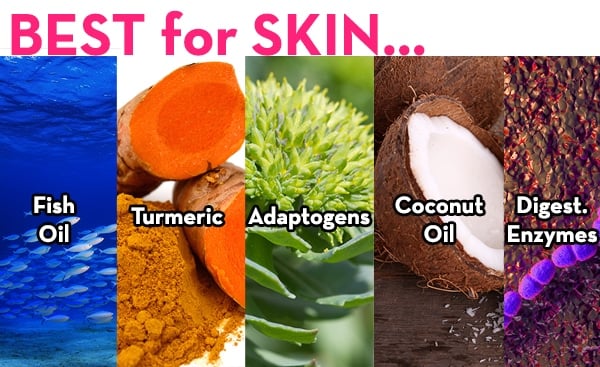
Fish Oil
The omega-3 in fish oil helps nourish and hydrate skin for an even tone and glowing complexion. That’s why high-quality fish oil is one of the best nutrients for your skin and for supporting dry, dull, inflamed, or acne-prone complexions. Research says: A study published in Experimental Dermatology found that omega-3 polyunsaturated fatty acids show potential to protect skin from UV radiation overexposure. UV overexposure is a leading factor in nearly all skin concerns from dryness and dullness, redness and inflammation, and aging and acne [1]. In addition, a study took place including 13 individuals with inflammatory acne that supplemented with fish oil containing 930mg of EPA (a measure of omega-3). It concluded that there’s some evidence that fish oil supplementation is associated with an improvement in overall acne severity, especially for individuals with moderate to severe acne [2]. Based on the mountain of available scientific evidence, it’s widely accepted the relative intake of omega-6 to omega-3 polyunsaturated fatty acids is an important dietary modulator of inflammation. Since inflammation plays a key role in acne, it’s not surprising that observational research studies discovered a lower incidence in cultures consuming diets with higher omega-3 fatty acid content. Omega-3 fatty acids inhibit the synthesis of the inflammatory molecule leukotriene B4, which in turn leads to reduced inflammatory acne lesions. Thus, it’s been postulated that increased consumption of omega-3 polyunsaturated fatty acids may reduce inflammatory acne. [**]Turmeric
Turmeric is rich in antioxidant properties, especially curcumin—a potent and powerful antioxidant in turmeric that gives your skin an ultimate beauty boost. For Alex, “Turmeric is my favorite spice! I add a teaspoon of freshly ground turmeric to my smoothie every morning for an antioxidant boost. We’re so used to associating antioxidants with berries and superfoods like acai. However, spices are an incredible source. Even better, they’re often a fraction of the cost of those fruits. Try a little turmeric mixed into your smoothies, rice, or tea.” Research says: Curcumin protects skin by fighting off free radicals, reducing inflammation, and even improving collagen deposition for wound-healing [1]. In addition, a review of the clinical research on curcumin found that it has potential as a therapeutic agent in IBS, pancreatitis, as well as certain types of cancer. The report concluded that curcumin “may have anti-inflammatory, anticancer and antioxidant properties” although it noted that these findings haven’t been confirmed in humans [2].Adaptogens
Adaptogens are herbs found to be beneficial in achieving and maintaining homeostasis, or the body’s natural ability to balance stress. They help us adapt to stresses, providing calm, relaxation, and mental stamina while fighting fatigue, depression, and anxiety. How do adaptogens support your skin? Remember that when we feel stressed, our brains release cortisol, which in turn boosts oil production. These excess oils mix with dead skin cells, dehydrate the skin, and exacerbate breakouts. Stress also causes blood vessels to dilate, inflaming the skin and causing it to appear dull, red, dry, or cracked. Research says: The Huffington Post reported on how the natural adaptogenic herbs ginseng, eleuthero, rhodiola, and ashwagandha are “global system regulators.” It means they help prevent signs of aging. Grape seed, grape skin (resveratrol), and ginger support the immune system of cells [1]. Meanwhile, the American Academy of Dermatology shows the negative effect of stress on the barrier function of the skin, resulting in dehydration and reducing cell renewal [2]. To counteract these negative effects on skin, this review shows the evidence-based efficacy of adaptogens to fight fatigue. Also, strong scientific evidence is available for rhodiola in improving attention, cognitive function, and mental performance [3].Coconut Oil
2015 was undoubtedly the year of coconut oil, with health and beauty benefits endlessly surrounding this superfood. From acting as a moisturizer to hair mask to deodorant, coconut oil has easily become a green-beauty essential. For skin—thanks to fatty acids, polyphenols, and vitamins E and K—coconut oil provides a true beauty boost. We believe that 2016 will be another great year for coconut oil. Research says: A randomized double-blind controlled trial comparing extra-virgin coconut oil with mineral oil found that it’s as effective as a moisturizer for xerosis, a skin condition characterized by dry, itchy skin. Mineral oil—derived from petroleum and widely used in cosmetics like creams and lotions—is said to clog pores and may be contaminated with harmful toxins, which is why the study showing coconut oil can be as effective a moisturizer is promising [1]. In addition, a Pharmacognosy Reviews paper on the potential of herbs for skin protection showed that coconut oil can block around 20% of UV rays [2].Probiotics
Probiotics are the healthy bacteria living in your digestive system. They can have a beneficial beauty boost as well, especially for your skin. According to Alex, “As a functional nutritionist, I work primarily on healing the gut for overall well-being. So many of us suffer from inflammation that is likely caused by GI issues or food sensitivities. A probiotic is one of the best defenses against a traditional Western diet. It’s something I recommend almost across the board. When you feel better, you look better!” Research says: A randomized double-blind placebo-controlled study on infants provided the first clinical demonstration of certain probiotic strains in reducing inflammation for helping atopic eczema [2]. Also, the American Academy of Dermatology released a report last year on early research of probiotics and acne. They cited a Korean study in which 56 acne patients drank a lactobacillus-fermented beverage. They found it effectively reduced their total acne-lesion count and decreased oil production over a 12-week period [3]. Other strains that caught our interest are lactobacillus rhamnosus. One study found it had “strong potential as a probiotic for preventing AD [atopic dermatitis],” which is characterized by itchy, inflamed skin. [4]Best Vitamins + Nutrients for Hair
For longer, stronger, shiny, fuller, healthier hair, get ready to start within. These top five vitamins and ingredients will promote cell renewal and strengthen your strands for glamorous locks.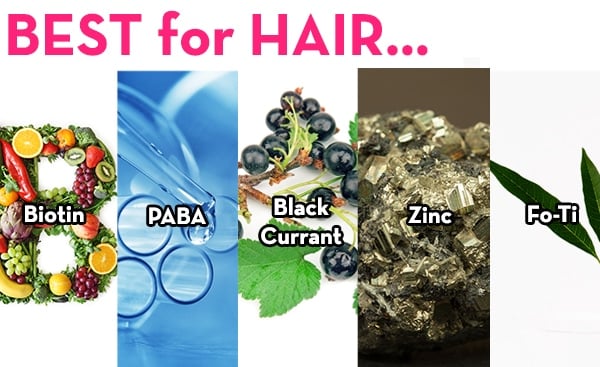
Biotin
Biotin is a B-complex vitamin that can be found in food sources like eggs, nuts, soybeans, and fish. It’s important in cell renewal, which is what makes it important in growing longer and healthier hair. Since we lose up to 100 hairs a day on average, proper cell function is vital for growing luscious-looking hair. Research says: If you take biotin, you might already be familiar with the horse hoof study. It looked at how biotin helped treat hoof abnormalities in horses. However, they found it was also helpful in strengthening brittle fingernails in humans. In addition to strengthening nails, most studies surrounding biotin and hair focus on how a biotin deficiency can lead to hair loss. One study found that biotin administration could reverse alopecia (hair loss) in children being treated with an anticonvulsant [1].PABA
According to Alex, “Para-aminobenzoic acid (PABA) is a chemical compound found in folic acid. It can also be found in foods like eggs and whole grains. PABA is often taken as a supplement to prevent hair loss, as PABA protects hair follicles and may reduce thinning hair. There are some reports that PABA can be used to darken gray hair, but since this isn’t a widespread effect, I don’t like to recommend it for this reason alone.” Research says: PABA aids in the metabolism of amino acids and supports red blood cells, playing a significant role in skin and hair [1]. It’s a key compound in folic acid, which helps all of your tissues grow and cells function properly. A folic acid deficiency can lead to a loss of nutrient absorption that can cause gray hair or poor hair growth [2].Black Currant Seed Oil
When it comes to growing shiny and full hair, black currant seed oil is packed with nutrients that can make it happen. Alex says, “Black currant seed oil contains GLA (gamma-linolenic acid), an omega-6 fatty acid that helps reduce inflammation. GLA is then converted into DGLA that fights inflammation. The benefits of GLA are widespread, as it’s used for reducing symptoms of RA, allergies, and menopause. Additionally, GLA not only benefits healthy, shiny hair. It’s also been shown in some trials to reduce symptoms of eczema and acne.” Research says: The omega-6 is a type of polyunsaturated fatty acid that can help stimulate skin and hair growth. These fatty acids help reduce inflammation, increase hair elasticity, and nourish the scalp from within [1] [2].Zinc
Zinc is a key mineral for health and well-being. According to Alex, “Zinc promotes cell reproduction, tissue repair, and functions in oil-secreting glands attached to our hair follicles. Zinc deficiencies can cause dry, flaky hair. Aside from supplements, zinc is naturally found in some animal foods like chicken, shrimp, and oysters.” Research says: Published in the Annals of Dermatology, a 2013 study found that zinc metabolism disturbances playing a key role in hair loss [1]. Zinc has also been studied for immune function, as severe zinc deficiency can depress immune function [2].Fo-Ti
Used in traditional and Eastern medicine, fo-ti has a plethora of health and beauty benefits. It’s particularly effective as a hair restoration treatment. The herb contains an alkaloid that can help cell renewal and hair health. Research says: The traditional use of fo-ti for preventing thinning hair and rejuvenating dry, brittle hair works by supporting the flow of oxygen in blood to the scalp to stimulate hair growth and reduce thinning, flat hair [1].*[1] Sibi G. Inhibition of lipase and inflammatory mediators by Chlorella lipid extracts for antiacne treatment. J Adv Pharm Technol Res. 2015 Jan-Mar; 6(1): 7–12. [2] Morita K, Ogata M, Hasegawa T. Chlorophyll derived from Chlorella inhibits dioxin absorption from the gastrointestinal tract and accelerates dioxin excretion in rats. Environmental health perspectives. 2001;109(3):289-94. [3] Takekoshi H, Suzuki G, Chubachi H, Nakano M. Effect of Chlorella pyrenoidosa on fecal excretion and liver accumulation of polychlorinated dibenzo-p-dioxin in mice. Chemosphere. 2005;59(2):297-304. **[1] Simopoulos AP. Omega-3 fatty acids in inflammation and autoimmune diseases. J Am Coll Nutr 2002;21:495-505. [2] Logan AC. Omega-3 fatty acids and acne. Arch Dermatol 2003;139:941-3. [3] Zouboulis CC, Nestoris S, Adler YD, Orth M, Orfanos CE, Picardo M, et al. A new concept for acne therapy: a pilot study with zileuton, an oral 5-lipoxygenase inhibitor. Arch Dermatol 2003;139:668-70. [4] Bowe WP, Joshi SS, Shalita AR. Diet and acne. J Am Acad Dermatol. 2010 Jul;63(1):124-41.
More like this
